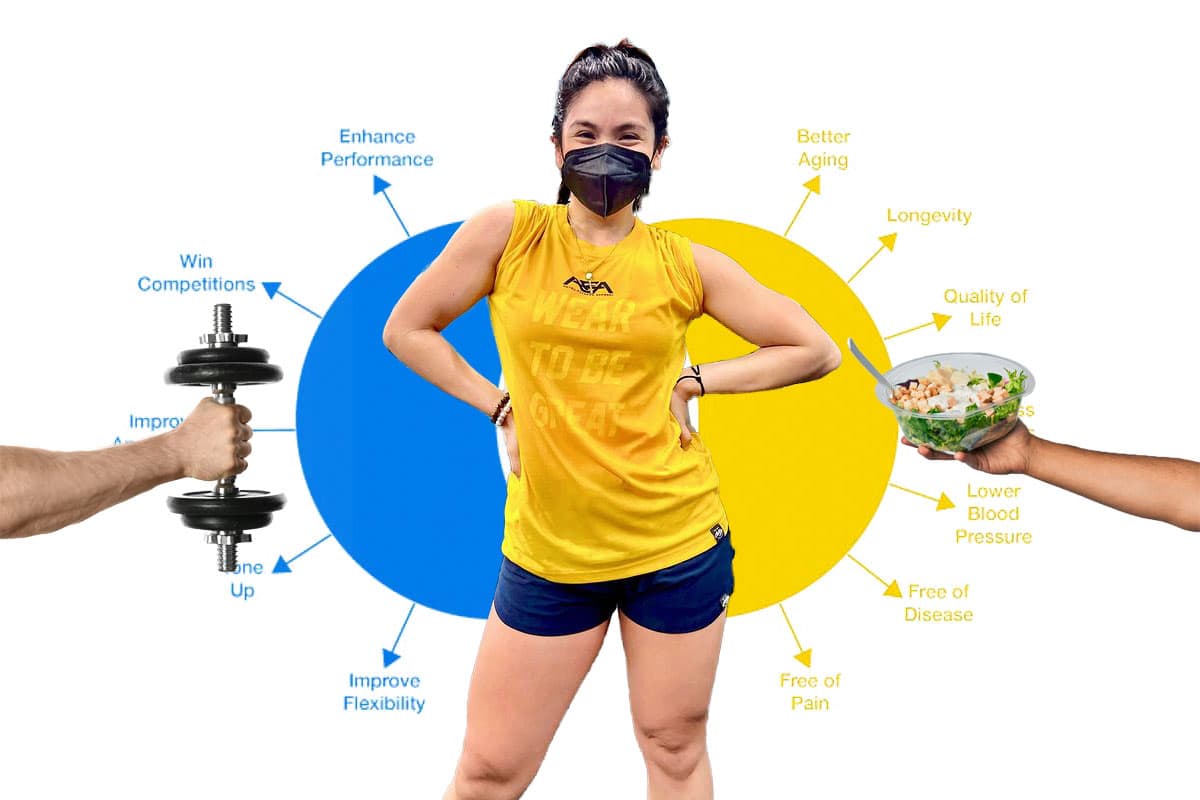Are you fit? You may think you’re healthy, but you’re not as fit as you think. Fitness standards are much higher than health standards because fitness is about more than just being alive. It’s about performing at your best physically, mentally, and emotionally.
If you want to be one of those people, it’s time to start pushing yourself beyond your current health limitations. Challenge yourself to reach new fitness levels and see how better you are to adapt to your ability to perform.
In this post, we’ll look at why fitness standards are often so much higher than health standards and whether or not they are necessary, and discuss some tips on how to improve your health and fitness.

The Difference Between Fitness And Health
Fitness and health are two separate things. Fitness is a measure of how well your body can do physical activity, while health measures how well your body functions overall.
So, what’s the difference between fitness and health? Let’s take a closer look.
Fitness is about how well your body can do physical activity. This includes how fast you can run, how far you can swim, how much weight you can lift, and how long you can stay active without getting tired.
On the other hand, health is about how well your body functions overall. This includes your blood pressure, cholesterol levels, body fat percentage, body composition, blood sugar levels, and risk of developing chronic diseases like heart disease, stroke, and diabetes.
Having good fitness means that you can do physical activity without getting tired too quickly. Having good health means that your body can function properly and that you’re not at risk of developing chronic diseases.
So, which one is more important? That’s up to you to decide.
If you want to do physical activity without getting tired, then fitness is more important. If you want to avoid developing chronic diseases, effective health is more important.
Both fitness and health are important, but ultimately it’s up to you to decide which one is more important for you.
Why Are Fitness Standards Often Higher Than Health Standards?
We often view fitness as a measure of how wonderful someone looks or how toned their body is. On the other hand, health is seen as a state of being in which all bodily functions are working properly. But the two are not always mutually exclusive - in fact, they can be quite intertwined.
While it’s important to be physically attractive, looking good doesn’t necessarily mean you’re healthy and conversely, just because someone isn’t in perfect shape doesn’t mean they’re not fit. So what’s the difference between the two?
According to a study, fitness standards are higher than health standards. To be considered fit, you don’t necessarily have to be free of all health conditions - you have to be able to perform well physically. On the other hand, you must be free of all disease and illness to be considered healthy.
This is why it’s possible to be fit but not healthy, or healthy but not fit. For example, someone who is obese considering their body weight may be considered fit if they can still run a marathon, but they would not be considered healthy because of the negative effects obesity has on the body.
Similarly, someone dealing with a chronic illness may be considered healthy if they don’t have other health conditions. Still, they would not be considered fit because of the illness's impact on their physical abilities.
It’s important to remember that fitness and health are not the same things, but they are important for overall well-being. If you want to be as healthy as possible, aim for a balance of fitness and health-enhancing behavior.
Are Fitness Standards Necessary?
Most people think that fitness standards are necessary to maintain a high level of physical ability. However, some believe that these standards hinder the ability to be physically fit and pass the physical fitness testing.
Physical fitness standards help ensure that people remain physically active and can perform everyday tasks. For example, standards help people know how much they should be able to lift, how fast they should run, and how long they should be able to stay active before becoming exhausted. These guidelines give people a goal to strive for and help them track their progress.
There are, however, some drawbacks to fitness standards. First of all, they can be hard to meet, especially those just starting on their fitness journey. This can lead to discouragement and even quitting before they see any results.
Additionally, fitness and physical education standards can be unrealistic for some people, especially those with health conditions limiting their physical abilities. Finally, fitness standards can be biased, as they are often based on the abilities of elite athletes. This can make it difficult for people of all shapes and sizes to meet the standards.
It is up to each individual to decide whether fitness standards are necessary. The benefits outweigh the drawbacks, while for others, the drawbacks are too great to justify following the standards. No matter what you decide, the important thing is to stay active and ensure that you are doing what is best for your body.

How To Reach Your Personal Fitness Goals
Millions of people in our families and communities set out to get fit each year, but only a small percentage succeed. If you want to be one of the few people who reach your fitness goals, you need to make sure you have a good plan and stick to it. So many people fail because they don’t have the right plan, or they don’t stick to their plan.
Here are some tips to help you reach your personal fitness goals:
1. Set Realistic Goals
Don’t try to lose 50 pounds in a month or run a marathon if you’ve never even run a 5K before. Start small and gradually work your way up to bigger goals.
2. Find An Activity You Enjoy
If you hate running, don’t try to make yourself do it every day because someone told you it’s the best way to lose weight. Find an activity that you enjoy and that you can stick with long-term.
3. Make A Schedule And Stick To It
If you want to exercise three times a week, make sure you do it simultaneously each week and put it in your calendar. This will help you make exercise a habit.
4. Get A Workout Buddy
A workout buddy can help you stay motivated and accountable. Find someone who has similar fitness goals and schedule a time to exercise together.
5. Join A Gym Or Fitness Class
If you need some structure and support, consider joining a gym or taking a fitness class. This can help you stay motivated and on track with your goals.
6. Hire A Personal Trainer
If you’re serious about reaching your fitness goals, hire a personal trainer. A trainer can help you create a customized workout plan and provide support and motivation.
7. Set Up A Home Gym
If you don’t have the time or money to go to a gym, you can set up your home gym. This can be as simple as a few dumbbells and a yoga mat, or you can invest in some fitness equipment.
8. Get Enough Sleep
Sleep is important for overall health and well-being, and it can also help with weight loss. Make sure you sleep at least 7-8 hours every night.
9. Eat Healthily
Eating healthy is important for reaching any fitness goal. Eat plenty of fruits, vegetables, and whole grains—part ways with processed foods and sugary drinks.
10. Be Patient
Don’t expect to see results overnight. It takes time and consistency to reach your fitness goals. Be patient and stick with it, and you’ll eventually see the results you’re looking for.
The Benefits Of Being Fit And Healthy
It’s no secret that being physically fit and healthy has a lot of benefits. But what you may not know is that being physically fit and healthy also has some major benefits for your mental health. There are many ways in which being physically fit, and healthy can improve your mental health, including reducing your risk of developing depression, improving your mood and cognitive function, and helping you to better cope with stress.
So, what are the specific benefits of being physically fit and healthy for your mental health? Let’s take a look:
1. Reduces Your Risk of Depression
One of the most significant benefits of being physically fit and healthy is that it can help to reduce your risk of developing depression. Numerous studies have shown a strong link between physical fitness and mental health, with one review finding that physically active people were up to 27% less likely to develop depression than sedentary people.
2. Improves Your Mood
Another benefit of being physically fit and healthy is that it can help to improve your mood. Exercise has long been known to be an effective mood booster, thanks to the release of endorphins, which are hormones that have mood-boosting effects.
In addition, research has also shown that regular exercise can help reduce symptoms of anxiety and depression, two conditions often associated with low mood.
3. Helps You to Better Cope with Stress
Another way being physically fit and healthy can benefit your mental health is by helping you better cope with stress. When you’re stressed, your body releases the hormone cortisol, negatively affecting your mental health, making you more prone to anxiety and depression.
However, regular exercise has been shown to help reduce the cortisol levels in your body, which can, in turn, help you better cope with stress. One study found that just 30 minutes of moderate-intensity exercise was significant enough to reduce cortisol levels.
4. Improves Your Cognitive Function
In addition to the mental health benefits we’ve already mentioned, being physically fit and healthy can also help to improve your cognitive function. Numerous studies have shown a strong link between physical fitness and cognitive function, with one review finding that physically active people were up to 30% more likely to have better cognitive function than sedentary people.
5. Boosts Your Self-Esteem
Finally, another benefit of being physically fit and healthy is that it can help to boost your self-esteem. Exercise has been shown to improve body image and self-esteem, which are important for mental health.
FAQs About Fitness Standards And Health Standards
1. What Type Of Exercise Is Best For Mental Health?
While any type of exercise can benefit mental health, some types of exercise may be more effective than others. For example, research has shown that aerobic exercise (such as running or swimming) can be particularly beneficial for mental health, thanks to the release of endorphins and other mood-boosting chemicals.
2. I’m Struggling To Motivate Myself To Exercise. What Can I Do?
If you’re struggling to motivate yourself to exercise, it may help to set yourself some specific goals or find a workout buddy to exercise with. You may also find it helpful to try a different type of exercise or find an activity that you enjoy, such as dancing or hiking.
3. I Don’t Have Time To Exercise. What Can I Do?
If you don’t have time to exercise, there are several ways you can fit it into your day. For example, you could try walking or cycling to work, taking the stairs instead of the lift, or doing exercises at home while watching TV.
4. Is There Anything Else I Can Do To Improve My Mental Health?
In addition to exercise, you can do several other things to improve your physical, mental and social health. For example, you could try eating a healthy diet, getting enough sleep, and managing stress healthily. You might also find it helpful to talk to a mental health professional if you’re struggling with your mental health.
Final Thoughts - Fitness Standards And Health Standards
We often don’t set the bar high enough when it comes to our health. We accept mediocre health as just a part of life and age but what if we didn’t have to settle for this? What if we could raise the standard for ourselves and demand more from our bodies?
This is where fitness comes in. Fitness isn’t about looking a certain way or achieving some arbitrary number on the scale- it’s about becoming healthier, stronger, and more resilient.
And fortunately, raising the bar for your health doesn’t require superhuman effort or genetics- it starts with making simple changes to your daily routine and being willing to push yourself a little harder than you think you can. If you need any help regarding your health and fitness, contact us. We are ready to help.
References:
https://study.com/academy/lesson/what-is-fitness-definition-components-types-examples.html
https://www.medicalnewstoday.com/articles/150999
https://www.ncbi.nlm.nih.gov/pmc/articles/PMC1402378/
https://www.ncbi.nlm.nih.gov/pmc/articles/PMC474733/
https://www.ncbi.nlm.nih.gov/pmc/articles/PMC3632802/
https://pubmed.ncbi.nlm.nih.gov/18787373/
https://www.ncbi.nlm.nih.gov/pmc/articles/PMC6527141/







Hi Team,
i am Ajay from Delhi India...